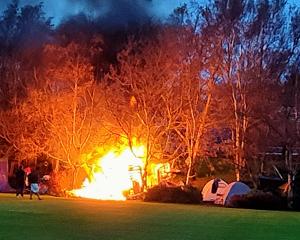Doubts about the ability of HMNZS Otago to patrol the Southern Ocean are unfounded, the ship's captain says.
Lieutenant-commander Rob McCaw brought the Royal New Zealand Navy offshore patrol vessel into Dunedin Harbour yesterday, at the tail end of a lengthy operation which included patrols throughout the Antarctic including the Ross Sea.
Earlier this week, Foreign Affairs Minister Murray McCully said a planned patrol of the Antarctic fishery was cancelled because of concerns about the ability of navy offshore patrol vessels to operate in the Southern Ocean.
He said he was advised the mission to tackle illegal or unreported fishing was not possible because it was ''not within the capabilities of the vessel''.
Lt-cmdr McCaw (32) joined the Otago crew as captain in September last year, at the start of the ship's current operating period.
''Up until Christmas, we were in the Southern Ocean patrolling and boarding fishing boats. We hailed 10 and boarded eight fishing vessels in the Southern Ocean within the ice, including one New Zealand vessel,'' he said.
''This year's the first year we haven't detected any illegal fishing boats in the New Zealand zone, which is a great result.''
Lt-cmdr McCaw said Otago and its sister ship HMNZS Wellington were Class 1C vessels, which meant they had the ''basic'' level of ice protection.
''That allows us to conduct operations throughout the Southern Ocean and Antarctic region, including the Ross Sea, providing the conditions are right. Every ship, no matter what class, has to be aware of what's happening in the ice,'' he said.
New Zealand was the only signatory to the Commission for the Conservation of Antarctic Marine Living Resources which sent its own navy ships to patrol the Antarctic, he said.
Operating in the Southern Ocean was a ''real challenge'' which tested the limits of both ship and crew, but also a ''buzz'', Lt-cmdr McCaw said.
''Not only are you having to navigate ice, shitty weather and snow, you then have to overlay the operational side of things like hunting fishing boats and intercepting them in the ice conditions. It's a really great challenge,'' he said.
Lt-cmdr McCaw said the navy's training for such conditions was ''world class'' and Maritime New Zealand was interested in presenting the programme to the United Nations as ''the standard''.
''That's pretty cool for us.''
He said Otago was scheduled to undergo routine maintenance once back in Devonport, where it would head to after departing Dunedin on Monday.
Advertisement













